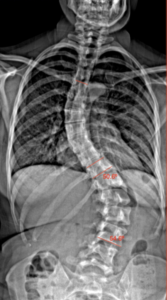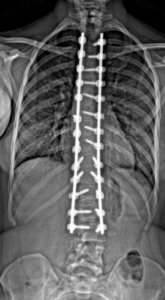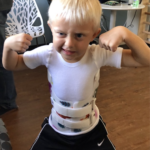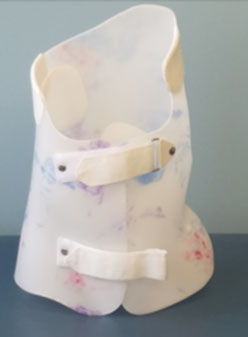Treatment Options
We have many different treatment options available for our guests. Dr. Hey and his staff explore all the options. Each patient is educated on ones that fit their condition. Not all disorders have the same treatment options and each guest is unique as well. The following is a list of treatment options we may explore to help with your spinal condition.
OBSERVATION
BRACING
PHYSICAL THERAPY
What is Schroth Physical Therapy?
Schroth physical therapy is a technique designed to strengthen and retrain the muscles of the back and core to hold the spine in better alignment. The goal is to elongate, de-rotate and stabilize the spine. The Schroth method consists of stretches, strengthening exercises, breathing techniques and postural training exercises using yoga blocks and balls, Schroth bars, poles and other equipment. The exercises are individualized for each person’s unique curve.
What makes Schroth different?
Schroth is a conservative, non-surgical approach to treating scoliosis. This form of treatment can be combined with bracing and has been shown to prevent progression of scoliosis and, in some cases, decrease the angle of the spinal curvature.
Schroth at the Hey Clinic
As part of our commitment to the conservative and lifelong care of our patients, we have multiple full-time Schroth certified physical therapists. The physical therapists develop a home therapy program so that the exercises can be continued on a daily basis, emphasizing our desire for lifelong care.

SPINAL INJECTIONS
Some spinal conditions can be treated with an injection. There are two main types of injections that we routinely prescribe.
Epidural Steroid Injections (ESI)
A steroid, which is a strong anti-inflammatory agent, is injected into the epidural space. This reduces inflammation caused by conditions such as a disc herniation or stenosis, thereby reducing pain.
Radiofrequency Ablation (RFA)
A small electrical current is used to heat the nerves in the facet joint. This limits the nerves’ ability to transmit pain signals.
If, during your visit here, you and the clinician decide that a spinal injection is the best route for treatment, we will order the injection and arrange for you to have this done at another medical office, as we do not perform them at the Hey Clinic.
SURGERY


In some cases, conservative treatment may be ineffective or not a suitable treatment option if spinal curvature has continued to progress or if the patient still has significant pain. Dr. Hey may consider a surgical approach, when necessary. To date, he has performed over 6,000 spinal surgeries that he carefully plans out with his team. He operates at Duke Raleigh Hospital and Wake Med Children’s Hospital, for patients under 14 years of age.
Here at the Hey Clinic, we created our own Electronic Medical Records software so that we can better serve you. Before surgery, we use the patient records to review medical history, medications, and symptoms to create a custom pre-surgery checklist. Every week we have a team “quality huddle” to review the checklist and make final preparations, helping the surgery go as smoothly as possible. We also developed an intra-operative checklist software named 3Greens™ that we use to make aviation-style safety checklists to ensure process standardization and encourage OR team coordination. In addition, we utilize a post-op checklist to monitor our patients’ recovery both during and after their inpatient stay.
ALTERNATIVE TREATMENTS
While massage, chiropractic care, Pilates, yoga, stretching and other therapies may provide symptomatic relief, these have been proven inefficient in correcting a scoliosis curve. The Scoliosis Research Society (www.srs.org) has published a paper on alternative treatments. Find more information about treatment options on their website.


